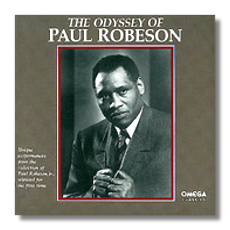
The Internet's Premier Classical Music Source
Related Links
- Latest Reviews
- More Reviews
-
By Composer
-
Collections
DVD & Blu-ray
Books
Concert Reviews
Articles/Interviews
Software
Audio
Search Amazon
Recommended Links
Site News
 CD Review
CD Review
The Odyssey of Paul Robeson

Recordings drawn from the personal collection of Paul Robeson Jr.
- John Henry, On My Journey, Sometimes I Feel Like a Motherless Child, Balm in Gilead, Star Vincino, O'Isis and Osiris, Prayer and Death, Every Time I Feel the Spirit, No More Auction Block for Me, The House I Live In, Joe Hill, Ol' Man River, Svivenem, Jerusalem, Deep River, Curly Headed Baby, Water Boy, All Through the Night, Danny Boy, Eriskay Love Lilt, Chinese Children's Song, Comments on Languages and Music, Hasidic Chant, Oh No John, Ode to Joy, Dan le Printemps de Mes Années, Othello (last speech)
Omega Classics OCD3007
It seems fitting, in this centennial year of Paul Robeson's birth, to review what may be the best single compilation of his music.
Robeson may be one of our century's most notable Renaissance men. He was a linguist and a star athlete; he could act in both Shakespearean plays and Hollywood productions, he was a trenchant writer and piercing theoretician, and, much to the detriment of his career, he was also a proponent of civil rights and radical causes at a time when it was quite dangerous to be so.
Parts I and III of this compilation are studio recordings, spanning from 1953 to 1958. Included are some standards that Robeson made famous, like "John Henry," the deeply affecting "Sometimes I Feel Like a Motherless Child," and Parry's Chartist arrangement of the William Blake poem "Jerusalem."
What makes this recording unique is the inclusion of two spoken segments, one telling a poignant anecdote of Robeson's father, who was born a slave. The other is a discourse on the similarities of languages in Africa and China. (Robeson knew twenty languages; his accents were impeccable.) There are also pieces that are less familiar to most audiences, such as "Prayer and Death" from Mussorgsky's Boris Godunov. If times had been different, or had Robeson been alive fifty years later, he would have made an excellent Boris. The tender rendition of Kodály's song "Svivenem" has never issued on recordings before, as it was culled from Robeson Jr.'s personal collection.
Part II was taken from a vintage performance at a 1952 civil rights meeting in Chicago. Songs like "No More Auction Block for Me" and "Joe Hill" speak to the more political side of Robeson and show his indomitable spirit even after he'd been blacklisted. Accompanied by his excellent pianist Lawrence Brown, Robeson clearly seems at home engaging the crowd. The audio is not the best, but it contributes to the living room feeling of the performance. Alas, herein lies a lost opportunity. Why couldn't Robeson Jr. have included a two-minute segment from the House Un-American Activities Committee session at which Robeson spoke, lambasting the McCarthyites. Would that have been pushing the envelope too far?
Part IV consists of live performances selected from late 1950's concerts. There is humor in the song "Oh No John," and lyric strength in Beethoven's "Ode to Joy," which Robeson not only introduces with impressive erudition, but sings both in English and German. The fact that it's difficult to relate to its earnest "all men are brothers" theme is more of an indictment of our cynical times than those in which Robeson sang. The program songs end wistfully with Carat's bittersweet "Dan le Printemps de Mes Années." Most movingly appropriate is the final speech of Othello, so well spoken that the listener can't help regretting that Robeson's performance in this play was never filmed. While pondering the course of his career, listen to him recite Othello describe himself as "one that loved fully wisely but too well." Then try to stop the chills from shooting up your back.
Copyright © 1998, Peter Bates


















